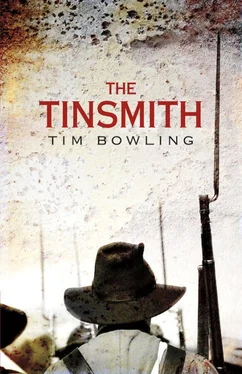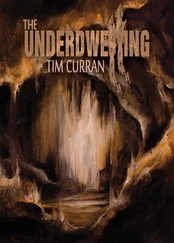When the doctor clutched his stomach and said he needed to go into the field a moment, John slipped away. The sun was well up. It was already hot. His face dripped sweat. The battlefield became a buzzing blur as he searched among the fallen. The bodies had begun to bloat and turn black. He gagged on the putrid air as he looked into the dead faces and as he negotiated the shell holes. Out of the corner of his eye, he saw a thin man in a clean suit approaching gingerly, a white cloth held over his mouth and nose. His hands were white-gloved and he wore a bowler. John stood motionless as the man stopped a few feet in front of him and lowered the cloth.
“You’re searching for a comrade?” He sighed. His lips were wet and pink and he seemed to hold his breath as he spoke. “A sad duty. Very sad.” He dabbed the cloth to his shining brow. Little beads of sweat hung off the ends of his elegant moustache. “But perhaps,” he said almost shyly, “you’d be willing to ease the suffering of others even as you carry out your duty?”
When John did not respond, the man removed a small white card from his breast pocket and offered it.
“This is a coupon. If, in your searches today, you should find any soldiers with this card on their persons, you can earn a considerable sum by transporting the soldiers to that tent, just there.”
He pointed to a small, dark encampment in the near distance.
“My employer, Mr. Horace Greaver, is a respected surgeon of the embalming arts.”
John blinked, his hands twitched at his sides. The man, who had lifted the cloth to his nose again, lowered it and winked.
“A soldier must always think of his family at home. I’m sure you are no different. Wouldn’t you like to be able to send more money to your beloved parents? Or, perhaps”—he smiled and the pink tip of his tongue emerged from between his pink lips—“your sweetheart? Listen.”
He stepped closer. His voice was hushed.
“I tell you this in confidence. The work’s more than I can handle alone. There are so many valiant dead. Such a sad day.” He bowed his head briefly. “But why should a soldier not benefit from it? The sadness is a fact. But so is life. And life requires industry and imagination. I can tell at a glance that you are intelligent. I tell you this in strict confidence.” He leaned forward, his chin seemed to be propped on the air of decayed flesh. “Officers. My employer will pay handsomely for officers. North or South. If you transport them to that tent. And tell him that Tomkins sent you.”
John did not fully understand, but the thought of the money appealed to him. If it turned out that he could not find the overseer’s body or that the sack of money was not on it, he would be happy for the… a sudden thought stopped the others.
“Are many bodies being taken to that tent?” he said.
“Oh, yes, there are others doing this work. It is a competitive venture indeed. But you are not, I can tell, a young man to shrink from competition.”
John considered. Perhaps the overseer’s body was at the tent? He turned away from the man without a word and headed south, his eyes scanning the ground for the overseer just in case. Within five minutes, he came upon an elderly Confederate soldier lying on his back. His face was fine-boned, and powder burns had darkened the neatly trimmed white moustache. His large, brown eyes fluttered. As John bent closer, the soldier’s lips moved, struggling to form words.
“Are you a soldier?”
“Yes, sir.”
The mouth opened again without sound. The eyes closed, opened.
“A federal?”
“Sir?”
“It doesn’t matter. Not if you’re a soldier.” The old man’s eyes remained open. “You’ll understand. I won’t recover from this fight. I do not wish to survive if I cannot fight. Please.” His lips hardly moved. His blackened skin ran in rivulets of sweat. A fly crawled along one eyebrow. “Please.” A tear formed in his open eye.
John looked around. No one was within a hundred yards. He could do this. This was not the same as what he’d faced with the overseer. This was more like the feeling he had standing beside the doctor. But as he moved his hands toward the old man’s throat, the horrifying image of Orlett’s doglike grin appeared on the face. Nigger. Goddamn ignorant. John hesitated. He watched the old man’s eyes close and not open. Then he knelt, gently pushed his arms under the old man’s back and legs, and lifted. The corpse was light, easy to carry in a cradled position. He hurried toward the embalmer’s tent.
• • •
An hour later, not far from the field hospital, he found the overseer in a neat line of dead Union soldiers. Jubilant, John searched the body. But the sack was not there. As he stood dumbfounded over the corpse, he had an overwhelming sensation that someone was watching him. Fearing it was the mulatto, he looked around wildly. Two hundred yards away sat the same single black cart and horse. A man stood near the cart, some kind of black object in front of him. John could feel the intensity of the man’s stare; it burned two circles of heat into his brow. He thought quickly. If the overseer’s body disappeared, others might believe he had simply left the area. The mulatto, especially, might believe it, he might leave to search. Without a corpse, John realized that he’d be safer. And the man staring at him would just think that he was carrying off a dead comrade for a private burial. Other soldiers were doing just that, either for themselves or for one of the embalming surgeons. And civilians also wandered over the broken field. His actions could not be regarded as suspicious.
He bent again to the overseer’s body but reeled back in shock as his eyes locked on the face. It still wore its living grin. John waited for the taunting to start, but only the drone of flies rose from the bloated lips. He waited longer than was safe. The man by the cart would be growing more suspicious; he might even decide to come closer to investigate.
At last, John took the overseer onto his back and headed for the woods hunched darkly on the horizon.
July 1881, Crescent Slough, British Columbia
Standing on the small black wharf just upstream from Dare’s cannery, Anson knew almost immediately which of the three skiffs approaching over the darkening water had his old friend at the oars. It was the lead boat, the one putting so much distance between it and the others, the one that drew the last few crimson shreds of light around it. As the skiff came close enough to the wharf for figures to be distinguished, as the smooth, steady power of the oar strokes replicated the most efficient machine in the cannery behind him, Anson saw that the years had not greatly diminished his friend’s strength. Dare pulled without pause, his shoulders level, his head raised. Anson could hear each quick grunt that accompanied the stroking, a natural sound, as of the day itself winding down with the light. Then the oars stopped.
As the skiff glided the last few feet to the wharf, Dare stood, still as tall and lean as Anson remembered. Sweat glistened on his sunburned forearms. He wore a white cotton shirt, the thick sleeves pushed up, crushed like the petals of great flowers around his biceps. A wiry, grey-flecked tangle of beard hid most of the lower half of his face but focused attention on the eyes. They seemed even larger than Anson remembered, darker and worn, as if two mixed handfuls of river and blood were continually breaking apart and being replaced. Except, Dare’s face also possessed a curious repose. Anson sickened at the contrast; it spoke too clearly of grave-grass pushing through the bars of a cradle.
Читать дальше












